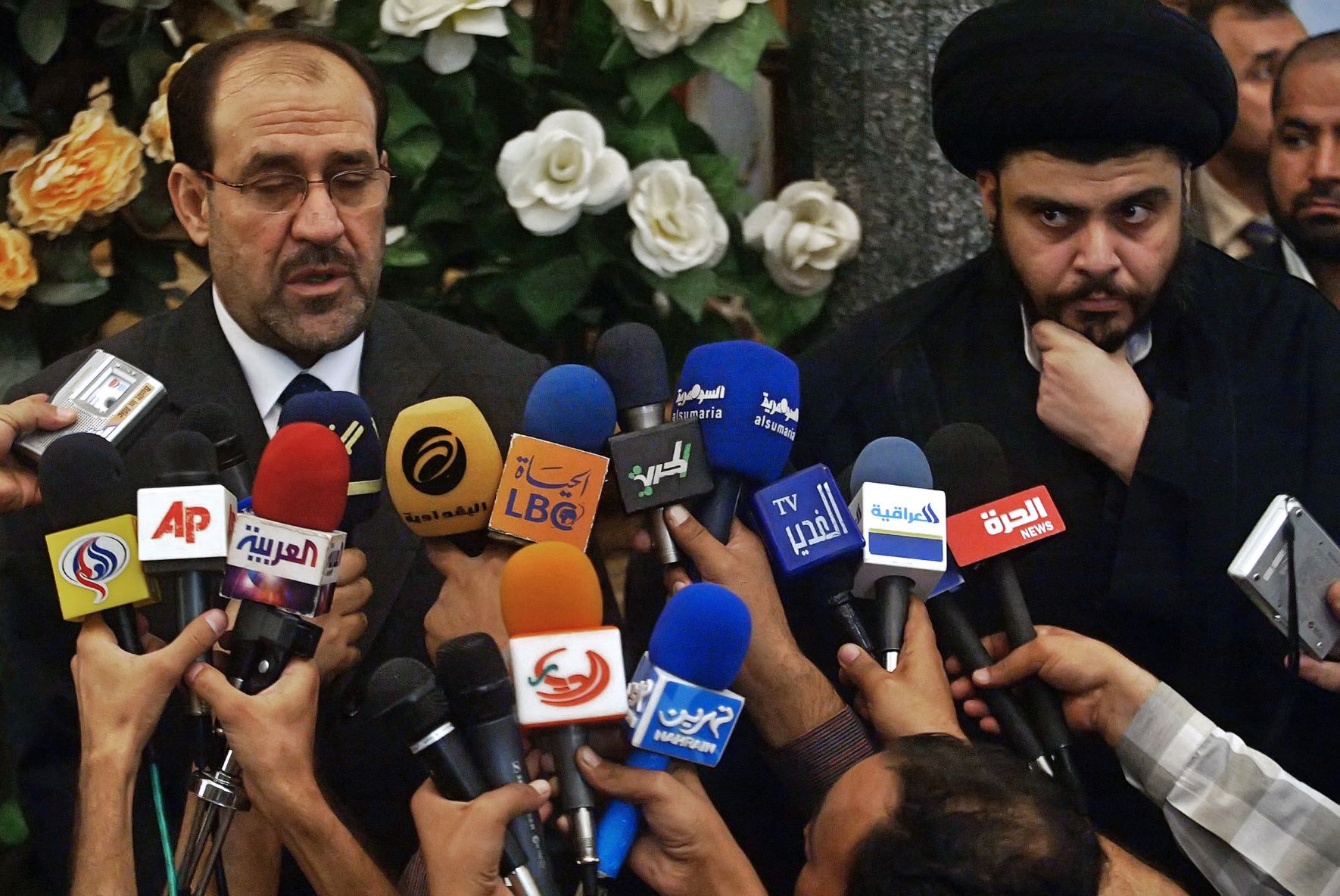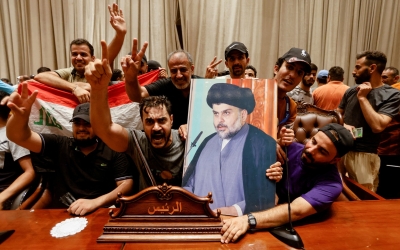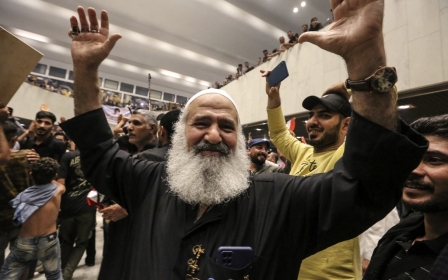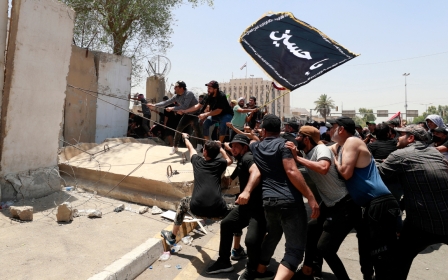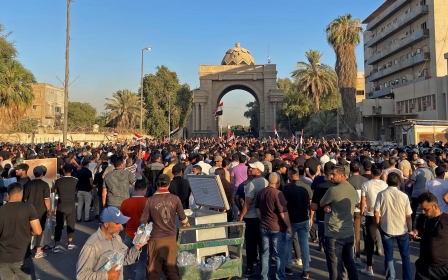Elections to protests: How Iraq descended into crisis
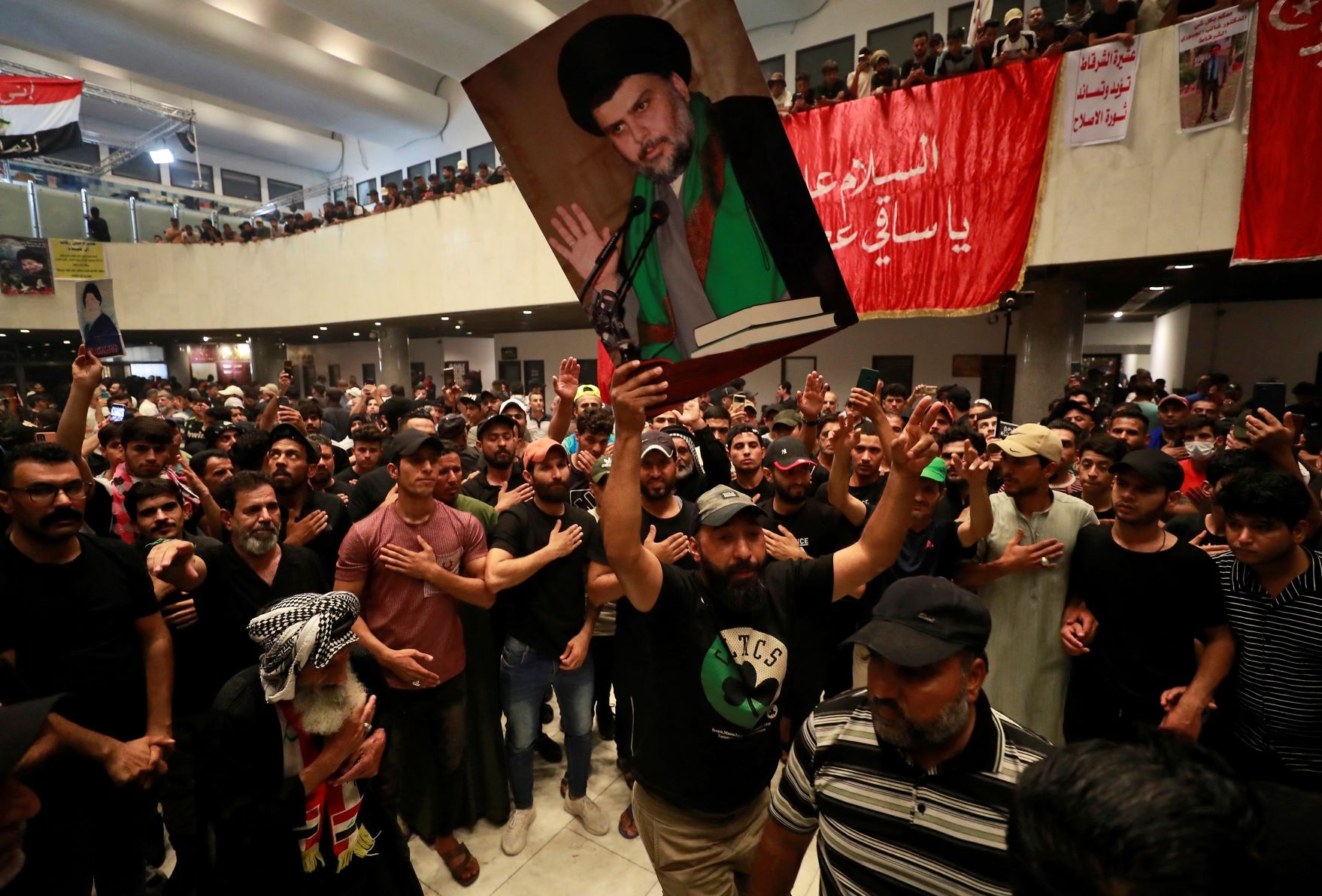
Once again, it seems that Baghdad is being pushed to the brink.
Residents of the Iraqi capital, which has for several years enjoyed a reduction in security measures, direct armed confrontations and bombings, have begun to guard themselves against possible unrest as two rival political factions face off.
Followers of the influential Shia cleric Muqtada al-Sadr have staged a sit-in in the Iraqi parliament, nominally in opposition to their opponents' choice for prime minister.
The process for forming a government has been under way since elections in October, but has so far achieved nothing. In response, the Sadrist MPs, who make up the largest parliamentary group, withdrew from parliament, leaving the process in the hands of the Iran-backed Shia Coordination Framework.
Tensions have spiralled between the Framework and Sadr's followers. On Monday, the Framework held a counter-demonstration in the capital, and there are fears among many Iraqis that things could spiral out of control.
New MEE newsletter: Jerusalem Dispatch
Sign up to get the latest insights and analysis on Israel-Palestine, alongside Turkey Unpacked and other MEE newsletters
The possibility of fighting between the two factions, both of which achieved just a small percentage of Iraqis' votes in October, has highlighted the fragility of the political system that was established after the 2003 invasion overthrew longtime ruler Saddam Hussein.
Middle East Eye takes a look at how Iraq came to this juncture:
How did we get here?
Iraq is regularly rated as one of the world's most corrupt countries, and unemployment, poverty, poor healthcare, power cuts, crumbling services and lack of safety have been facts of life for millions of Iraqis since 2003.
Though the threat of terror attacks by the Islamic State group and others had for many years limited the ability to protest over many of these issues, from 2015 civil society activists began to launch demonstrations calling for an overhaul of the political system and an end to corruption.
Sadr, who had previously been known for leading an insurgency and whose supporters took part in post-2003 administrations, declared his support for the anti-corruption protests, and his followers joined in the demonstrations - some would say overwhelmed them.
In 2016, during one protest, the demonstrators broke into the parliament buildings and the prime minister's office, a move that has been repeated in recent days.
Demonstrations would continue in the coming years, particularly in the southern provinces of Dhi Qar and Basra. In 2019 they swelled into what became known as the Tishreen (October) movement, with tens of thousands of people occupying Tahrir Square in Baghdad and other areas across the country, demanding the transformation of the political system.
Though Sadr initially announced his support for the demonstrations, with his followers turning out in droves, eventually he turned against them, and Sadrists attacked Tishreen encampments across Iraq. Despite this, Sadr has attempted to maintain an image as an opponent of the Iraqi establishment and as a nationalist opposed to outside influence, whether from the US, Iran, Turkey or any other country.
The October 2021 parliamentary elections took place after the introduction of a new electoral law designed to satisfy the Tishreen demand for more candidates to elected from outside the powerful political parties that have dominated post-2003 Iraq.
However, few were happy with the reforms, and, despite the presence of a number of candidates drawn from the Tishreen movement, the elections had the lowest turnout in Iraq's history, with just 43 percent of eligible voters taking part.
Sadr's Sairoon coalition won the largest number of seats, followed by pro-Sunni Mohammed al-Halbousi's Taqadam party and the State of Law coalition led by former prime minister (and longtime Sadr foe) Nouri al-Maliki.
Why is there no government?
Government formation in Iraq has never been easy. Since 2003 the country has been run largely according to the sectarian "Muhasasa" system, which sees key positions divided up along religious, ethnic and tribal lines.
In order to form a government, the parties in parliament needs to establish blocs to nominate a president and then a prime minister.
Sadr had attempted to form what he called a "majority government" by allying with Sunni and Kurdish elements. This would have upended Iraq's traditional power-sharing system and frozen out his rivals in the State of Law and Fatah coalitions, which are supported by powerful Iran-backed armed groups.
A Sunni coalition led by Halbousi and Massoud Barzani's Kurdistan Democratic Party, the biggest party in the northern Kurdistan Regional Government, both threw their weight behind Sadr.
His opponents coalesced in the Coordination Framework, in an attempt to strengthen the unity of Shia parties and muscle out Sadr and his allies.
What followed were months of boycotted parliamentaries meetings, failed quorums and bitter in-fighting. Parliament failed even to agree on a president, who is traditionally a Kurd, after the Kurdish parties were unable to agree on a joint candidate.
In June, in what he said was a bid to break the deadlock, Sadr ordered his MPs to withdraw from the parliament. This left Framework as the dominant force in the body.
The situation further deteriorated after a controversial series of audio recordings, purportedly featuring Maliki, were leaked to the Iraqi press.
In the recordings, Maliki appeared to rail against Sadr, accusing him of being "bloodthirsty" and being bitter that the former prime minister had "destroyed" him in the 2000s, when Iraqi security forces cracked down on the Sadrists and their paramilitary.
"Iraq is on the verge of a devastating war from which no one will emerge unscathed, unless the project of Muqtada al-Sadr, Massoud Barzani and Muhammad al-Halbousi is defeated," Maliki can be heard to say.
"If we defeat their project, Iraq will survive, and if we are not able to achieve that, Iraq will enter the danger zone."
In response, Sadr condemned his longtime foe, calling on him to "announce seclusion and retire from political work," saying he had "no right after these destructive thoughts to lead Iraq in any way, as that would mean devastation and destruction for Iraq and its people".
The final straw for Sadr appears to have been the Coordination Framework's nomination last week of Mohammed Shia al-Sudani as its candidate for prime minister.
Denouncing Sudani, a former minister under Maliki, as "corrupt," Sadrists stormed the parliament on 27 July in a bid to disrupt the goverment formation process.
Although on that occasion Sadr ordered to followers to "return home," the move further inflamed the situation, with Maliki posting defiant pictures on social media patrolling with a gun and armed guards.
What's happening now?
By the end of July, Iraq had been without a government for the longest period in its post-2003 history.
On 30 July, following a call from their leader, Sadr supporters again flooded into the supposedly heavily fortified Green Zone, which holds the parliament, other key offices and the US embassy, pulling down the obstructive concrete blocks that have become ubiquitous around sensitive areas of the city.
The Sadrists set up camp in the parliament building, bringing in equipment for cooking as well as livestock and bedding.
In a tweet, Sadr praised the occupation of the building as a "golden opportunity" to "fundamentally change the political system, the constitution and the elections".
"I call on everyone to support the revolutionaries for reform, including our proud tribes, our heroic security forces, members of the Mujahid Popular Mobilisation Forces who refuse submission and subservience, and all groups of the people to support reform, men and women, young men and children, not under my banner or leadership, but under the banner of Iraq and the decision of the people," he wrote.
"And if you miss the opportunity, do not blame me, for I am calling you to what is in your interest and reform, and to save your homeland, your dignity, your sustenance, your bounties, and your prestige."
His call, however, fell on many deaf ears. Instead, the Framework announced it would be holding a counter-protest on the evening of 1 August, in a move to defend the "legitimacy" of the state's institutions.
Ahead of the counter-protest, security forces set up roadblocks and checkpoints along the roads surrounding the Green Zone, anticipating a possible clash between the two groups. Security was also beefed up around the airport
As they arrived, pro-Framework demonstrators chanted against Sadr and in favour of Maliki. Some held placards reading "the people will not allow a coup".
Perhaps fearing the possibility of escalation, however, two of the most powerful Iran-backed actors - Kataib Hezbollah and Fatah coalition leader Hadi al-Amiri - said they would not be taking part in the demonstrations, with Amiri calling for negotiations and warning against bloodshed during the holy month of Muharram.
Sadr's spokesperson tweeted that they were open to dialogue with Amiri if he were to leave the Framework and denounce Maliki's comments in the leaked recording.
What happens next?
Sadr's Saraya al-Salam militia has been deployed around the Green Zone, while on 1 August he also called on his supporters across the country to take to the streets. Meanwhile, Framework supporters marched on the Green Zone, throwing stones and bottles at security forces and managing to pull down at least one concrete block.
There have long been fears, particularly following the defeat of the Islamic State in 2017, that the country's main Shia political factions could fall into open conflict.
It is impossible to say whether the current crisis could lead to that or if the country and its armed groups are too exhausted from almost two decades of violence.
Regardless, it seems unlikely that the current dispute will lead to any major change in the system. With all of those involved unable to command the support of more than a small fraction of the electorate, the majority of Iraqis have long felt left out and powerless.
"They are useless. In past elections, we voted and nothing changed," said one non-voter, Mohammed, speaking to MEE in October.
"They are all bad people."
Middle East Eye delivers independent and unrivalled coverage and analysis of the Middle East, North Africa and beyond. To learn more about republishing this content and the associated fees, please fill out this form. More about MEE can be found here.


